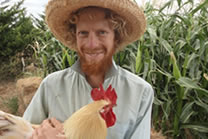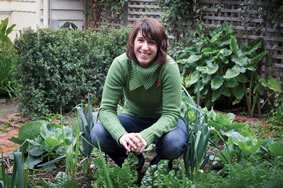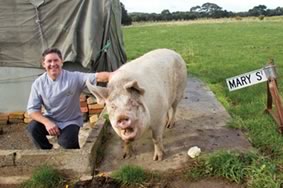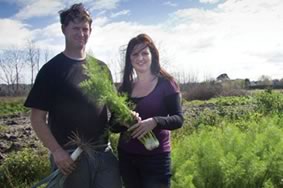There is a growing interest in wanting to know where our food comes from
Most of the food we consume in Australia is not only being transported long distances to our plates but what goes into our food and who actually produces it is hidden from us.
Eating locally can be beneficial to both the environment and your health, and in putting your dollars into supporting the local community and farmers directly.
6 Big Reasons to Eat Local Food
 |
Produce that is purchased in the supermarket often has been in transit or cold-stored for days or weeks, while produce from your local farmer’s market or farm-gate has often been picked within 24 hours of your purchase.This freshness not only affects the taste of your food, but the nutritional value. Locally grown fruits and vegetables are often allowed longer to ripen, because they do not have to be “rugged” or to stand up to the rigors of shipping, and so can be handled less. (You are going to be getting peaches so ripe that they fall apart as you eat them!). |
 |
By buying locally grown food you’ll be strengthening your community by investing your food dollar close to home.Only 18 cents of every dollar, when buying at a large supermarket, go to the grower. 82 cents go to various unnecessary middlemen. Cut them out of the picture and buy your food directly from your local farmer. |
 |
By eating with the seasons, we are eating foods when they are at their most flavoursome, are the most abundant, and the least expensive. |
 |
Whether it’s the farmer who brings local apples to market or the baker who makes local bread, knowing part of the story about your food is such a powerful part of enjoying a meal. |
 |
In CERES ‘Food miles in Australia report, 2008’, an average shopping basket of 29 common food items traveled over 70,000 kms—that’s nearly two times the distance around the Earth. Just four imported items accounted for nearly 50,000 kms. |
 |
Our present industrialised food system involving transporting food long distances is dependent on the artificially low energy prices that come with ‘cheap oil’. This will not last forever.World oil production has already peaked, according to some estimates, and while demand for energy continues to grow, supply will soon start dwindling, sending the price of energy (and food) through the roof. Why wait to re-evaluate our food systems when we are forced to, when we can start to build resilient local economies now by supporting energy efficient agricultural methods, like smaller-scale organic agriculture, and local production? Find out more. |
What some of our friends have to say
 |
Adam HillsComedian, Spicks & SpecksI am a moron. Seriously, a moron. My forefathers would be ashamed of me. Oh sure I can tweet such world-changing thoughts as what my breakfast consisted of, or shoot zombies for hours on end on a simulated computer game – but put me in a garden and ask me to fend for myself and I’m like a puppy in an electronics store. Fascinated but ultimately hopeless. Thank you Local Harvest. Now computer-literate but garden-dim people like me can access all we need to know about growing our own fresh food, sharing it with others, and finding local produce. It is such a brilliant idea, I don’t know why we didn’t think of growing our own sustainable and healthy food before. Oh that’s right, we did. But we all got distracted by computers. Can you believe some people spend hours on end playing a computer game called “Farmville”? |
 |
Jackie FrenchChildren’s author, Earth Garden ColumnistWhat you eat – and how you eat it – can change the world. Local food, or food grown with love or cooked with pride and idealism, doesn’t just keep you alive; it keeps you in contact with the earth, the seasons, and your community. It creates a web of friendship. Most of all, perhaps, it makes you deeply happy – sharing food, loving how it tastes, every mouthful with a story of fulfilment behind it. And when you are happy – the deep kind of happiness that comes from giving and receiving harvests and food made with love – you feel powerful enough to change the world. In fact, you have already begun. |
 |
Jerry Coleby-WilliamsOrganic gardener, Director of the Seed Savers NetworkLocal Harvest is a user-friendly, online directory that helps Australians everywhere to increase their consumption of fresh, local and sustainably grown food. I encourage people to convert streets and parks to permaculture, and to develop intensive organic food production at home. Since the passing of Peak Oil, strategies like these support Australian food sovereignty – and climate repair – in a Warming World. Jerry is also one of the initiators of Grow Local, a Queensland Conservation community project. |


